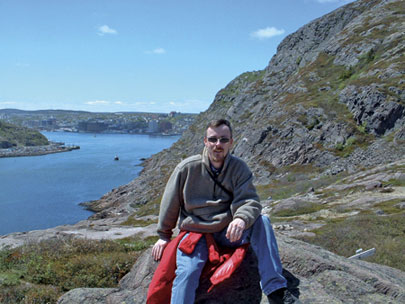SUSTAINABILITY ISSUE
Know your environment!
Courses that teach the finer points of the world around us

Professor Ian Strachan visiting Signal Hill, Nfld
‘Climate change.’ Do these words ring a bell? An alarm bell, perhaps? Now that greenhouse gases are on everyone’s mind, public concern about environmental issues is more in-vogue than ever. But a little knowledge can be a dangerous thing.
Marketing and advertising agencies happily scratch our itchy conscience. Eco-styled labels, slogans, and packing are found on countless consumer goods, and even on ‘sustainable’ vacations to exotic wildlife habitats around the world. As sources of information, they are inadequate at best, and misleading at worst.
When it comes to learning what is right for you and right for your environment, absorbing sound bytes from newspaper or radio reports is a weak substitute for proper education.
Several courses offered at McGill stand out on the wide menu of choices. A casual survey of a few dozen current and recently graduated students came back with some favourite selections. (Thankfully, departmental advisors can suggest many more courses than can be listed here.)
ENVR 202: The Evolving Earth
Co-taught by a rotating cast of four professors from various departments
Course description: ENVR 202 journeys to the center of the Earth. The core argument is that geological and biological change is the consequence of history, chance, and necessity acting over different scales of space and time. Topics range from general principles governing the formation of landscapes and biotas to the effects of human activities on natural systems.
Comments: Through a roller-coaster ride hurtling forward from the Big Bang to humans hewing tools from rock, this course weaves together the fabric that makes up life on Earth stich-for-stich with the Earth itself. Each lecture delivers unique content. However, the Herculean effort of internalizing the overarching themes is proportional to satisfaction.
Other noteworthy courses: BIOL 304: Evolution.
GEOG 321: Climatic Environments
Taught by Prof. Ian Strachan
Course description: GEOG 321 is about climatology, physical, dynamic and applied. Topics include the Earth/atmosphere system, energy balances and governing meteorological processes. It covers the movement and circulation of the atmosphere on a local and global scale, and resulting weather systems.
Comments: In a word, GEOG 321 is “fantastic,” says David Oswald, a recent MSc graduate in Geography and president of his own firm, DE Design-Environment. Oswald gets right down to brass tacks: “if you really want to understand natural systems and how they work, then it is best to take the appropriate foundation courses.” He stresses that courses on environmental management or economics are no less important. But, one should explore ‘foundation courses’ if they want to know “what is really going on.”
Other noteworthy courses: GEOG 505 Global Biogeochemistry. GEOG 308: Remote Sensing. BIOL 310: Large-scale Ecology.
GEOG 380: Adaptive Environmental Management
Taught by Prof. Garry Peterson
Course description: GEOG 380 articulates and evaluates competing hypotheses about the functioning of human-dominated ecosystems. It introduces the use of statistics, ecological modeling, and management in an integrated ecological management context.
Comments: According to Ciara Raudsepp-Hearne, a PhD student in Geography, ‘adaptive management’ promotes an “understanding that we don’t always have the answers.” We must be “cautious, strategic and creative when it comes to managing environment and development.” Students learn to swallow their pride and rally all talents in this course, which Prof. Peterson leads into—and lets loose in—group assignments.
Other noteworthy courses: ANTH 339: Ecological Anthropology. ENVR 400: Environmental Thought. BIOL 465: Conservation Biology. MGCR 360: Social Context of Business; URBP 520: Globalization: Planning and Change.
ECON 347: Economics of Climate Change
Taught by Prof. Chris Green
Course description: ECON 347 focuses on the economic implications of, and problems posed by, predictions of anthropogenic global warming. Few aspect are left un-mentioned, though attention is given to economic policies such as carbon taxes and tradable emission permits and to the problems of displacing fossil fuels with new energy technologies.
Comments: With a coursepack that could prop open a bank vault and an instructor who is as animated and engaging as he is concerned with the subject at hand, this course reflects its title to a ‘T’—it can be daunting. Nadya Wilkonson, a U3 German Studies student involved in several campus environmental groups, admits, “It gave me that hint of science a Faculty of Arts student doesn’t usually rely on to back up pro-ecological arguments.” Prof. Green invites in-class presentations from those that are inspired to share their views; these students can expect ample constructive criticism.
Other noteworthy courses: PHYS 228: Energy and the Environment. ARCH 377: Energy, Environment and Buildings.
CIVE 323: Hydrology and Water Resources
Taught by Prof. VTV Nugyen
Course description: CIVE 323 explores statistical analysis, stochastic modeling and simulation of precipitation, streamflow, groundwater and reservoirs, and more. Case studies include hydroelectric power development, flood damage mitigation, irrigation and drainage.
Comments: If you ever saw a draught first-hand or drank the wrong tap water in a developing-world city, you might have wondered about quicker routes to clean, sustainable water supplies—beyond law and politics. This course works out tangible, quantitative water questions through mathematics and engineering. As some say, “water is the new oil,” and global warming has already ushered in shortages. Kealan Gell, co-founder of Gorilla Composting and a former Engineering undergraduate, is glad he poured long hours into his assignments. “I think more analytically about digging ditches or building wastewater-to-biogas plants. I’ve done both on farms in several countries, actually.”
Other noteworthy courses: CIVE 430: Water Treatment and Pollution Control. CIVE 225: Environmental Engineering.

